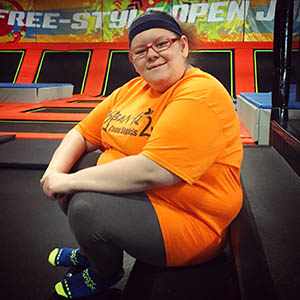Council-Sponsored Grant Activities: Employment (2018)
The Discovery Process serves as a person centered planning tool, a strategy for learning about a person's interests and talents, and the skills that he/she would bring to the workplace. Each person's school, volunteer, and past work experiences are important in identifying vocational themes to create a match between a field of work and the job seeker's areas of interest. This is a process that builds on personal strengths and abilities and, through informational interviews, offers the opportunity to learn what a specific job before deciding if a match would be a good one.
In 2017, seven transition students and nine adults with developmental disabilities were directly employed, earning minimum wage or above.
The Mounds View transition program is now using the information gathered from students through a discovery process as a starting point for career planning. Traditional "assessment" processes are no longer being used. Students are now securing employment in jobs that are more person centered.
Success Stories:

Andrew, employed at Hyvee
Andrew is enjoying his job at Hyvee and a variety of responsibilities. First and foremost, he's a grocer and bagging groceries. But he also stocks shelves and does some general cleaning. He brings experience in the business with him but his previous job was very limiting and not the best match, where he was retrieving carts and didn't like the outdoor work. Here, he's indoors, likes stocking shelves, likes the variety, and much prefers the Hyvee culture.

Emily, employed as a nanny
Emily has recently changed jobs and is now working as a nanny. Her love is working with children and she is definitely gaining a great deal of experience in the field. Emily has worked in day care centers and has had several previous jobs as a nanny. In addition to her regular 20 hours per week, she has made herself available on call for additional hours.

Andrea, employed at the Hampton Inn
Andrea is naturally a quiet person, likes to keep to herself, and enjoys working independently. Her housekeeping job at the Hampton Inn is a good match and it's close to her home – a preference. Andrea stocks supplies for the other housekeepers and make sure that all public areas are clean for an always changing flow of hotel guests.

Candace, employed at Urban Air Adventure Park
Candace enjoys caring for others and being part of a team in an atmosphere where people are having fun. Her strengths and interests are a good match for her position as a Café/Eating Area Assistant at Urban Air Adventure Park, an indoor recreation center and party place, where she helps at the café and in the dining area.

Ryan, employed at Raising Cane's Chicken Fingers
Ryan has a new job as part of the morning crew at Raising Cane's Chicken Fingers. He cleans, does food preparation, delivers orders to customers and checks the bathrooms. He earns $10.00 per hour and works 25 hours per week. This job is a good match for Ryan's social skills and it offers a variety of tasks which he prefers. He enjoys asking customers if they are done so he can take away dirty dishes and whether they had a good experience at the restaurant.
View 2017 Employment Grant Activities »
View 2016 Employment Grant Activities »
View 2015 Employment Grant Activities »
View 2014 Employment Grant Activities »
View 2013 Employment Grant Activities »




